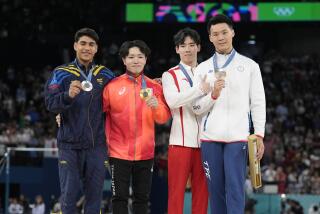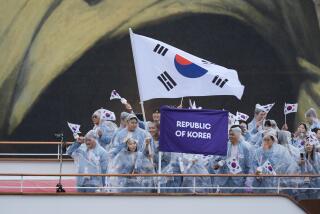Olympics Language Barriers: Hard to Hurdle
- Share via
SEOUL, South Korea — When 25,000 athletes, officials and journalists from 160 countries converge at the Olympics, even the swiftest, the strongest and the most agile find themselves at a loss for words.
That is where the 6,000 interpreters and translators--including specialists in such languages as Swahili, Polish and Hindi--step in to bring some order to the Olympic tower of Babel.
But while business at the 24th Summer Games in Seoul proceeds smoothly--aided by simultaneous interpreters of English, Japanese, Chinese, Arabic, and five European languages--outside the sporting events it is often a different country.
Taxi drives have been glimpsed staring blankly at people as they ask to be taken to some of the most popular Olympic destinations, and visitors say ordering a meal in a Korean restaurant or shopping in stores can be a chore because of language barriers.
To prepare itself for an unprecedented influx of foreign visitors during the Games, the South Korean government called in 1985 for 5,000 citizen volunteers fluent in foreign languages. Some 35,000 South Koreans responded.
A group of foreign women living in Seoul weeded out the unqualified in a screening process that lasted about one minute per person.
“The first thing we asked them was, ‘What would you do if this building was on fire?’ ” said Jane Robb, the American founder of the group. “If they replied, ‘My name is Lee Chong-young, nice to meet you,’ they flunked.”
“If they looked at me and said ‘Why are you asking me such a stupid question?’ they passed,” she said.
Since 1986, the women coached those who passed in English conversation, and the government strongly recommended taxi companies teach drivers to speak some English.
The 370 drivers at Seoul’s Iljin Taxi Co. attended four mandatory English in short, helpful sentences.
There were televised English conversation contests in which taxi drivers vied with each other to win television sets or first-place certificates, highly prized in education-conscious South Korea.
If English does not exactly roll trippingly off the tongues of South Korean taxi drivers, visitors to the Games have pronounced many of them adept at such snappy phrases as “Where are you going?” “I will take you,” and “Now we are at---.”
A daily radio program sponsored by American Express and broadcast in Seoul also attempted to teach drivers everything they needed to know about transporting a visitor from one point to another--almost.
A story floating around the Main Press Center was about an NBC newsman who jumped into a taxi and asked to be taken to the “MPC.” Thirty five miles later, he found himself staring at miles of barbed wire at the DMZ, the demilitarized zone that divides South Korea from communist North Korea.
Some Olympics visitors even plunged in to learn Korean, using their official Korean staff as informal tutors.
Ousmane Daouda, a taekwando expert from Niger in western African, told a Korean newspaper in deft Korean, “I am one of the most good-looking men in the Olympic Village.”
Daouda and his friend, featherweight boxer Djingarey Mamouda, said they had learned about 50 Korean words and phrases, including “I am hungry” and “I love you.”
“It’s not difficult at all to learn Korean because I really love to be here,” said the 26-year-old policeman. “The only problem is that I may forget it when I go back to Niger.”
Korean candor and a halting English ability can produce some amusing incidents, such as what happened to Robb, an official volunteer at Olympic cycling events.
“You must have been so beautiful,” one young Korean military officer told the attractive, gray-haired housewife from Orinda, Calif.
A fellow officer nudged him in the ribs and whispered in his ear, and the man turned back to her and smiled.
“Wrong verb form,” he said.
More to Read
Go beyond the scoreboard
Get the latest on L.A.'s teams in the daily Sports Report newsletter.
You may occasionally receive promotional content from the Los Angeles Times.






